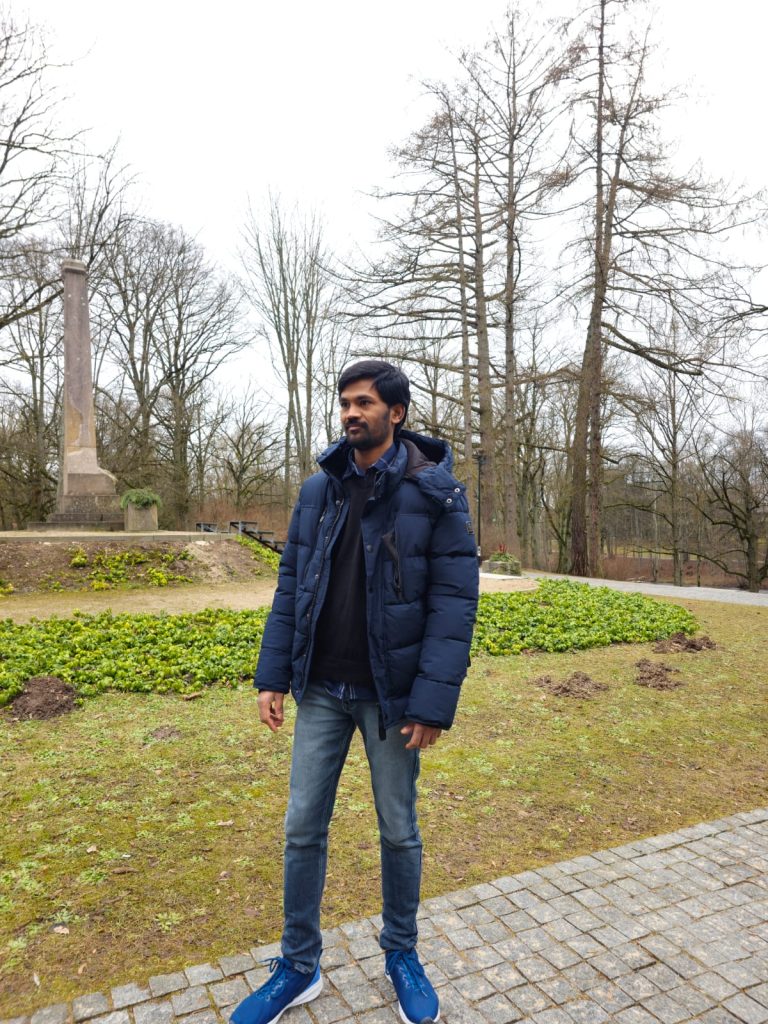Jyothi came to Latvia in 2017 to study, expecting to leave soon after finishing his master’s degree. Now, in 2023, he’s still here, working for an equipment manufacturer and soon to complete his PhD. How did that all happen? We met to chat about Jyothi’s experience of moving to Latvia from India, adapting to the local climate, food and lifestyle.
The common thread in Jyothi’s answers is personal effort and how much of it he has put in to get to the comfortable place he’s in right now. He repeats several times that his story is rare because of how well everything has turned out for him, and that one should consider different perspectives before making the decision to move.
Why Latvia?
Jyothi, who comes from Visakhapatnam, had no intention of going abroad. After his bachelor studies in mechanical engineering, Jyothi pursued an education in civil services, which prepares students for police officer or administrative roles. “Unfortunately, I wasn’t happy,” he shares, discovering that he didn’t feel suitable for these posts. At that point, he started thinking about where he could go and how he could afford it and settled on Europe. After doing some research, Jyothi found that many European countries require local language skills to study there. Having settled on Germany, he started to learn German but didn’t get accepted into university and lost two years of his time. He then considered Canada because it’s English speaking until a colleague suggested Latvia or Poland. Jyothi chose Latvia, applied and got his visa. Everything went smoothly.
On the strength of stereotypes
Jyothi didn’t know anyone in Latvia and had no experience of foreign countries. At Riga Airport, he met a senior who helped him book a taxi to the university dorms. “They were in an old building in a forest. Like a devil’s house. I was scared. Then, 200 metres away, I saw some Indian guys. My first experience was bad. I’d imagined something different – that everything would be awesome, that foreign means rich,” he’s honest about the power of stereotypes. Jyothi requested to move to the dorms at Ķīpsala, on the Riga Technical University (RTU) campus where he felt a lot happier.
Learning by doing
At the time, his faculty was still in its old location a fair distance away, next to Lake Ķīšezers. To get there was challenging. “In India, we never use Google Maps because we have it all in our heads; we can go anywhere. In Latvia, I’d always be on the wrong side of the street and miss my bus. For six months that kept happening. Once, I took the wrong route. Then, I realised Latvia isn’t big. I think Riga is like 20% of the size of my city. I looked at Google Maps and realised that every bus is travelling in a circle and that, even if I catch the wrong bus, I can walk,” Jyothi speaks of learning to make his way around.
Roads were just one aspect that Jyothi had to learn to navigate. It also took a while to acclimatise to the weather. When he arrived in September, the weather was “like winter for me in India.” When winter first struck, Jyothi enjoyed it as it was his first time seeing snow. However, a few days later, he fell sick after not wearing a proper jacket. “I went out in a sweatshirt. After that, I realised I need to take precautions. New climate, weather, minus degrees… I went back to India on holiday. I missed my family,” he shares.
Learning to love local cuisine
The local diet too took a while to get used to. Jyothi was vegetarian and found that most dishes in Latvia involved pork or beef. He could cope with chicken, however, was avoiding chicken and eggs at the time for religious reasons, so he never ate outside the house or just had some fruit.
Gradually, after returning from India he became more adventurous, eating the occasional bit of meat. But it wasn’t until he started to work that he switched completely to the “Latvian diet” – a mix of potatoes or rice, salads and meat – due to his colleagues’ encouragement. “I ate it once and liked it. After a week, I felt like a real Latvian. I realised that the food is good, but I only ate chicken. Two weeks later, they encouraged me to try pork. They asked if my parents would eat pork. Yes, they would. So, I tried. To be frank, I don’t like it. Two days later, it was someone’s birthday party. My colleague bought wild venison. It didn’t feel that different.
Now, I eat Latvian food and suggest that everyone eat Latvian food because this food is suitable for this climate. If you come to India and don’t eat spicy food, you can’t survive. If you go to Germany, eat German food. You’ll be happy, healthy, and your stomach will be full,” Jyothi explains his philosophy.

Funding the move and getting a job in Latvia
Having lived here for six years, Jyothi has established many valuable insights on what to expect when moving to Latvia from India. Money is a big topic. “Everything is expensive compared to India. In India, for one euro you can get a full meal. Here, the same costs five or six. Many students won’t have their parents’ backing. I came on a loan because I didn’t want my parents to sponsor me – I was already 25. So, I had to spend every euro wisely. We couldn’t get jobs because we needed Latvian language skills,” Jyothi speaks of the challenges.
He outlines the role of fear too: “You can’t expect foreigners to arrive knowing Latvian. I came for the education, so you can’t expect me to talk Latvian. Ok, after one year I can try to talk but many people are scared to learn Latvian. And Latvians seem scared to talk to foreigners. I asked my colleagues why people don’t talk to foreigners, and they said people are shy about talking to others and scared to talk in English. They’re not avoiding you.”
“Since I have a loan, I thought, if I stayed in Latvia for a year, I could repay my loan by working somewhere. I applied and got a good job immediately. They offered me a five-year visa. But many of my friends, who came earlier than me, applied for hundreds of jobs. Companies say that knowing English is enough. Then, after the interview and the task they give you – designing a machine, for example – they don’t offer you the job. So, my seniors said that I wouldn’t get a job and should go back to India but I thought I’d try my best,” Jyothi says of the job situation in Latvia.
Because of his good results at university, Jyothi was offered a PhD along with getting a job. Now, he combines his research with working as a konstruktors (design engineer) for a company in Iecava. Initially, he travelled to Iecava from Riga every day, but the travel time took its toll. In 2020, just before the Covid-19 pandemic kicked in, he moved to Iecava. He mentions that the cost of living is something to keep in mind: “In Latvia, salaries aren’t high. The cost of living has increased but salaries haven’t. As a foreigner, I can’t work in two places because of visa regulations.”
Communicating with locals in Latvia
For students wishing to work alongside their studies, part-time work opportunities are limited. “Now, there are food delivery services, but they didn’t exist when I first came. People couldn’t get jobs and faced racism. I haven’t experienced racism, but my friends have,” Jyothi touches on the sensitive topic. “In India, we have castes. Abroad it’s racism… It’s everywhere,” he speaks of people’s tendency to discriminate each other. He believes that “if you’re free with everyone, your country will grow faster. If you want to grow as a country, you need to have good communication with other countries. Your people too will grow.”
Of his own experience of learning to communicate with Latvians, Jyothi says: “When I first arrived, I didn’t speak to locals because people were scared. I decided, if someone comes to me, I’ll talk. If no one approaches me, I’ll just do my work – that’s it. When I started working, I realised I needed to explore the culture and understand what kind of people Latvians are, how they think etc. In India, we have the tradition that we shouldn’t talk to unknown girls, so I talked to guys. I learned that if you’re friendly with Latvians, they’re friendly too. If you’re angry, they’ll be angry.”
Jyothi learned that getting to know a different culture takes time: “Latvians won’t believe foreigners right away but if they spend time with you, they will. That’s a good thing. You shouldn’t believe anyone at the first point of meeting. Observe, learn. That’s good ethics.”
Now, Jyothi is learning Latvian by talking to his colleagues at work. He’s almost ready to pass his A2 level language exam.
Speaking of the Latvian language, Jyothi mentions a confusing aspect. Once you’ve arrived in Latvia to study, the Office of Citizenship and Migration Affairs (PMLP) is one of the first points of contact. While you can submit paperwork in English, the answers come through in Latvian, so students, for example, consult their professors to translate for them.
Among other things to keep in mind if moving to Latvia, Jyothi mentions that there is no one single Indian community in Latvia. “We’re Indians from different states. Everyone has their own community. I’m from Andhra, and we have our language.”
He also advises being aware of cultural differences: “I’m a simple person. I study, do my job, go home. I don’t like to travel much. I feel uncomfortable about going to Latvian parties because I don’t drink and smoke and feel uneasy if someone is drinking near me. So, I don’t want to spoil the party. Some people, when they’re drunk, may not understand.” He also doesn’t appreciate that people smoke in public, ignoring the designated smoking areas.
Studying in Latvia
Jyothi studies at Riga Technical University (RTU) and is happy with the quality of the education and facilities. “Many people feel that RTU is tough because they don’t have a good background. In India, what I studied during my bachelors, I studied here during my masters. Here, the studies are more practical. In India, we give more importance to theoretical knowledge. But I also know that other Latvian universities have a more “relaxed” approach [than RTU],” he shares.
For anyone coming to Latvia to study, Jyothi recommends joining the welcome tour that the university offers as an introduction to the campus and local culture. He regrets skipping it and missing out on valuable practical information.
To Latvians he suggests tapping into empathy: “We’re far from our cultures and homes – everything is different. Treat foreigners like locals. Speak with us. Come to know us. Teach your children good things. We just came here to explore. Maybe one day you’ll need my help, and one day I’ll need yours. Who knows?”











